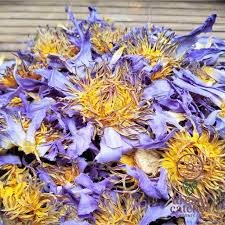Blue Lotus Stamen Tincture
Organic Blue Lotus Stamens, Organic Cane Alcohol
Anti-anxiety; psychoactive; enhance well-being; pain-relieving; improves memory and circulation; regulates irregular periods; aphrodisiac; treats dyspepsia, enteritis, diarrhea, urinary problems, fevers, heart palpitations.
Organic Blue Lotus Stamens, Organic Cane Alcohol
Anti-anxiety; psychoactive; enhance well-being; pain-relieving; improves memory and circulation; regulates irregular periods; aphrodisiac; treats dyspepsia, enteritis, diarrhea, urinary problems, fevers, heart palpitations.
Organic Blue Lotus Stamens, Organic Cane Alcohol
Anti-anxiety; psychoactive; enhance well-being; pain-relieving; improves memory and circulation; regulates irregular periods; aphrodisiac; treats dyspepsia, enteritis, diarrhea, urinary problems, fevers, heart palpitations.
Blue lotus is a sacred plant with a long history of ceremonial use. In Egypt, it was associated with the sun — the lotus opens in the morning and closes at night — and with Horus, the bull-headed god, who was often depicted sitting or standing on a lotus, much like both Brahma and Buddha. The lotus has been held as a sacred plant across cultures, from Buddhists and Hindus to the Syrians and Egyptians, all who believe the lotus brings prosperity, fertility, and allows the inner being to bloom. For the Egyptians it was a flower of resurrection, often used in funeral rights and depicted in artworks on tombs; in India, similarly, it represented birth and rebirth. It was immortalized for the West in Homer’s Odyssey, when Ulysses comes ashore to an island of lotus eaters, which hints its other well-known use: that of an intoxicating, perhaps even psychedelic plant, used in both shamanic and bacchanalian celebrations.
Blue lotus has often been considered a gateway to the divine, known for supporting deep meditative energy, enhance intuition by opening the third eye, and encouraging lucid dreaming. It is a nervous system relaxant and can promote restful sleep. It is said to have one of the highest vibrations of any plant, stimulating spiritual evolution and encouraging a gentle unfolding of the spiritual self.
Medicinally, blue lotus has been used for pain relief, similar to arnica, for muscle relaxing properties; to improve memory and circulation, and to help regular irregular periods and ease menstrual cramps. It is an aphrodisiac and said to enhance well-being. In Ayurvedic medicine, blue lotus has been used to treat dyspepsia, enteritis, diarrhea, urinary problems, fevers, and heart palpitations.
Socially, it is sometimes used to replace alcohol, as it helps alleviate social and sexual anxiety. It can also help with withdrawals from nicotine and other drugs. It can also help with spiritual journeys. Some people experience a gentle, cheerful state, something equivalent to a mild MDMA, increasing empathy and relaxation and allowing people to be more comfortable socially — and yet some people report no feeling at all.
Side-effects, at higher doses, can include tremors and nausea. It is not to be taken with Benzodiazepines or other sedative medications because it may increase their effects, and it is important to monitor your blood sugar carefully if you have diabetes.
